

Sample size estimation and power calculations. Course Outline: The concepts of sample size estimation are introduced, including when and why this might be necessary.
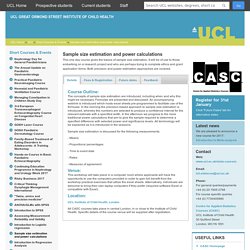
Formulae are presented and discussed. An accompanying weblink is introduced which hosts excel sheets pre-programmed to facilitate use of the formulae. In the morning the precision-based approach to sample size estimation is introduced, whereby the numbers are selected to produce a confidence interval for the relevant estimate with a specified width. Introduction to Meta-analysis.
Course Outline Meta-analysis is “the statistical analysis of a large collection of analysis results from individual studies for the purpose of integrating the findings” (Glass, 1976) We introduce the merits of meta-analysis and how it can form an important and informative part of a systematic review.
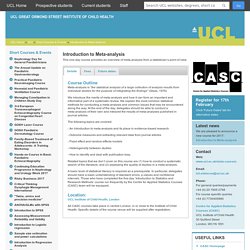
We explain the most common statistical methods for conducting a meta-analysis and common issues that may be encountered along the way. At the end of the day, delegates should be able to conduct a meta-analysis of their own and interpret the results of meta-analyses published in journal articles. Critical Appraisal. Course Outline: The ability to critically appraise published research is a key skill for anyone involved in using and/or undertaking research.
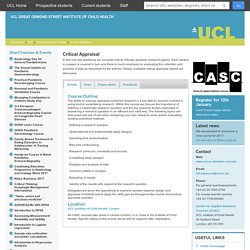
Within this course we discuss the importance of defining a meaningful research question and the key research factors implicated in answering a research question in an efficient and valid way. The following topics are discussed and are of use when designing your own research study and/or evaluating existing published material: · Defining a research question · Observational and experimental study designs · Sampling and randomisation · Bias and confounding · Research protocols, checklists and records · Competing study designs.
Statistical Computing with R Programming Language: a Gentle Introduction. This short course (6 to 8 hours) provides a gentle introduction to the R software and programming environment.
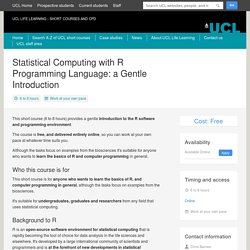
The course is free, and delivered entirely online, so you can work at your own pace at whatever time suits you. Although the tasks focus on examples from the biosciences it's suitable for anyone who wants to learn the basics of R and computer programming in general. Who this course is for This short course is for anyone who wants to learn the basics of R, and computer programming in general, although the tasks focus on examples from the biosciences. It's suitable for undergraduates, graduates and researchers from any field that uses statistical computing. Background to R R is an open-source software environment for statistical computing that is rapidly becoming the tool of choice for data analysis in the life sciences and elsewhere. Additionally, R is the foundation of Bioconductor, a similar open-source project focused on the development of bioinformatics analysis tools. Analysing 2x2 Tables (Statistics) Overview This one-day course aims to demystify the range of statistics that can be used to summarise the associations between two binary variables.
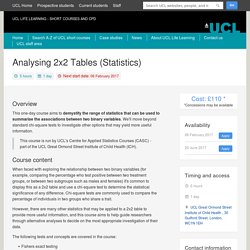
We'll move beyond standard chi-square tests to investigate other options that may yield more useful information. This course is run by UCL's Centre for Applied Statistics Courses (CASC) - part of the UCL Great Ormond Street Institute of Child Health (ICH). Course content When faced with exploring the relationship between two binary variables (for example, comparing the percentage who test positive between two treatment groups, or between two subgroups such as males and females) it's common to display this as a 2x2 table and use a chi-square test to determine the statistical significance of any difference.
Multilevel Data Analysis Using R. Overview This one-day course will give you an introduction to multilevel research design and data analysis using the R statistical environment.

Research increasingly requires more complex designs with more data, often collected from individuals in different social contexts or backgrounds. This creates: a methodological challenge because such data violate basic assumptions of independence of measurements required for linear regression an opportunity to understand how factors at different levels of analysis (e.g. school, organisation, etc.) can impact on individuals The workshop will introduce you to methods, techniques and software that can be used to address these challenges and to take advantage of the opportunities that multilevel approaches offer. About Statistical courses.
Continuing Statistics Training Scheme Come to 6 day-courses, get a 7th free!
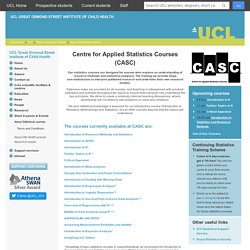
You will be given a card when you come to your first course and a stamp for every course you attend until you're ready to claim your 7th day-course for free. Email us to be added to our mailing list to be the first to hear about our latest news and the latest dates for future statistics courses Who are we?
The Centre for Applied Statistics Courses (CASC) comprises Director of CASC Professor Angie Wade, Senior Teaching Fellow Miss Eirini Koutoumanou, Teaching Fellows Dr Vicki Aldridge, Dr Dean Langan, and Sophie Lee, and administrator Patricia John. The team also features a guest lecturer, George Michaelides, who runs the 'Multilevel Data Analysis using R' course. Contact us Website: www.ucl.ac.uk/stats-courses Email: ich.statscou@ucl.ac.uk Phone: For general queries/payments, call us on: +44 (0) 20 7905 2768 For course specific queries, call us on: +44 (0) 77 30405 980** Where are we based?